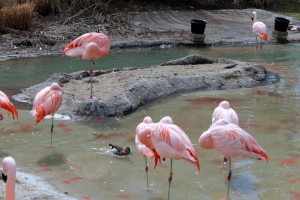E.H. Lupton's Blog, page 8
June 16, 2014
Episode 2: Nestor
This is a short episode but one in which many of the novel’s famous lines occur.[1] Here we see Stephen Dedalus as a teacher in a boys’ school, teaching history, literature, and maths to his students. After they go outside for a field hockey game, Stephen talks to his boss, the headmaster Mr. Deasy, about various topics—money, the English, religion, and foot-and-mouth disease. On this last topic, Mr. Deasy asks Stephen to take some letters to newspaper editors he knows, and Stephen agrees. As he leaves, Mr. Deasy chases him down to offer one last (anti-Semitic) joke.
There is a lot to talk about here in terms of colonialism—Stephen teaching his students the history of ancient Greece, his inner thoughts on Haines’s remarks in the previous section, his recollection of seeing a Siamese person working in the library in Paris in which he was studying, the boys playing field hockey (an English game) rather than hurling (a somewhat similar Irish game), Mr. Deasy’s reverence for all things British (up to a picture of Albert Edward on his wall[2]), and so on. There’s a lot to say also about the father-son connections—as Tindall observes, Deasy (pronounced like “daisy”) seems to want to be a father figure to Stephen, who rejects his advances; Deasy’s name seems to prefigure the appearance of Leopold Bloom (who occasionally goes by the pseudonym “Henry Flower,” but we’ll come to that in time),[3] who will serve as a better (?) father figure to Stephen. There’s a lot about religion and a lot of pretty clear parallels to the Odyssey (Deasy represents Nestor to Stephen’s Telemachus). But I’m not going to talk about all of that right now, or not directly. I’m going to talk about this line:
—History, Stephen said, is a nightmare from which I am trying to awake. (2.377)
What does this mean? Don Gifford notes that it is a reference to Franco-Uruguayan poet Jules Laforgue, who wrote, “ ‘La vie est trop triste, trop sale. L’histoire est un vieux cauchemar barioléqui ne se doute pas que les meilleurs plaisanteries sont les plus courtes’ (Life is very dreary, very sordid. History is an old and variegated nightmare that does not suspect that the best jokes are also the most brief)” (1988, 39). This is interesting but unilluminating. Tindall notes that the entire chapter is about history—in fact, it is listed as the “art” of the chapter on the schemas. “To [Stephen] the past is intolerable, its shape arbitrary, its materials fictive and uncertain . . . Confined to time and space, history is impermanent and unreliable” (1959, 141). But this again is mostly a restatement of what Stephen is actually saying, rather than an explanation thereof.
I should add that I’m holding out on you a little—Deasy provides a clue when he replies, “The ways of the Creator are not our ways . . . . All human history moves towards one great goal, the manifestation of God” (2.380–1). This is a very Victorian view of history, although Gifford traces it all the way from Augustine of Hippo through Giordano Bruno to Georg Wilhelm Friedrich Hegel himself (1988, 39). By contrast, Stephen’s view is much more modernist verging on post-modern[4]: rather than being a progression toward something, history is instead the nearly random actions and reactions of a disparate group of people with variable motives, terrible and uncontrollable.[5] For a writer, there are some interesting implications to this. Stephen is, of course, denying the idea of destiny, but maybe there’s more than that. Books, after all, contain a plot wherein actions within a narrated time stream take place in a certain order and come to a conclusion. In a certain sense, because the plot is created by someone outside the novel, the conclusion is in fact a preordained final point toward which the rest of the book works. By awakening from the “nightmare” of history, Stephen can perhaps step outside this emplottedness and write something different, something that similarly lacks destiny.
Reading Stephen as Joyce, of course, we can say definitively that he did manage this with Finnegans Wake.[6] But that’s breaking the fourth wall a little bit. And it’s also not entirely fair, because obviously when he was writing this, Joyce didn’t know that he was going to write Finnegans Wake. But if he really did go out to “Forge in the smithy of [his] soul the uncreated conscience of [his] race” (Portrait, 275–6), I suppose we can guess that he probably had something brewing.[7]
There’s one other thing I want to talk about with regards to this episode, which is movement. In the whole section, Stephen stands in his classroom, goes to Mr. Deasy’s office, and then walks out of the school. There is absolutely nothing remarkable here—very little movement, some strained conversation without much in the way of emotion or really description, but yet through what Joyce refers to as a personal catechism,[8] we as readers not only get a good sense of Stephen’s emotions, but we tacitly understand that this is somehow his last day of this. He is leaving the school. As he declared in the first episode that he won’t return to the Martello tower, he also won’t return to the school. I’m not the only one who senses this, by the way—Tindall also remarks on it (1959, 141). This is thematically appropriate somehow—the first part of Ulysses seems to concern death: the death of Stephen’s mother, the funeral Bloom attends, and also the death of certain parts of Stephen’s life—he is leaving the tower, leaving his job. He has reached a certain point of life—I can certainly relate to this feeling—where the things of his youth no longer fit, yet he doesn’t quite know which of the trappings of adulthood he’s reaching for—he doesn’t know what he’s going to be yet.[9]
Where is he going? What will become of him? Tune in tomorrow for the next episode.
Notes
[1] The assertion that these are famous lines is made in the Ulysses Wikipedia article and is uncited. But I think it’s true. (See Wikipedia ).
[2] Prince Albert Edward was Edward VII (r. 1901-1910); his son Albert Victor was possibly somehow mixed up in the Jack the Ripper killings but probably just a somewhat weird product of royal inbreeding. See also my essay on From Hell, “That Sick Feeling: From Hell Reviewed.”
[3] Leopold Bloom is our Odysseus to Stephen’s Telemachus, but we won’t meet him until episode 4.
[4] That’s right, I said post-modern. I’ll talk a little more about the (surprisingly many) po-mo aspects of the book later on.
[5] As Amy Fish at the Modernism Lab at Yale University points out, Ulysses was composed directly after World War I, a time when the idea that things were going in a planned direction seemed especially ludicrous.
[6] Damn, I said I wasn’t going to talk about the po-mo stuff until later on. Also I should point out that in a sort of weird ironic counterpoint to my suggestion that the Wake is something different from the nightmare of history qua novel plots, it’s about one man dreaming all of human history. I think.
[7] Okay, I didn’t mention this before, but you should know that Ulysses is sort of a sequel to A Portrait of the Artist as a Young Man, which was originally the (unpublished) book Stephen Hero, and the character of Stephen Dedalus is a somewhat thinly veiled (or, say, semi-autobiographical) version of Joyce himself, who at one point used the name “Stephen Daedelus” as a pen name.
[8] This is the term he uses in the Gilbert schema (here).
[9] I apologize for my gratuitous use of the em dash in that last sentence.
References
Fish, Amy. “Nestor.” The Modernism Lab at Yale University. http://modernism.research.yale.edu/wiki/index.php/%22Nestor%22. New Haven, CT: Yale, 2010.
Gifford, Don, with Robert J. Seidman. Ulysses Annotated: Notes for James Joyce’s Ulysses. 2nd ed., rev. and exp. Berkeley: University of California Press, 1988.
Joyce, James. A Portrait of the Artist as a Young Man. Edited, with an introduction and notes by Seamus Deane. New York: Penguin, 2003.
Tindall, William York. A Reader’s Guide to James Joyce. New York: The Noonday Press, 1959.


June 8, 2014
Capital View “Couples” Duathlon
Lest you think my life is entirely given over to literature now . . .
I got up at 5:10 this morning to go do a duathlon, primarily because I signed up for it in a fit of enthusiasm back in . . . March or something. It was so close to my house, such a good chance to practice biking in race conditions before my tri in July. It would be fun.
Fun. I remember fun.
Okay, so I went into this race feeling a bit overtrained. “But Em, overtraining sounds like a positive thing, like you’re really on top of your training!” No. Overtraining is a thing that can happen if you train too much and don’t recover sufficiently–don’t take enough days off.[1] Symptoms include fatigue and decreased performance (despite speed work, you’re not getting faster); gastrointestinal upset; an increase in respiration rates or higher resting heart rate; lower appetite and increased thirst; decreased motivation to work out; feelings of sadness/depression or anxiety (for example, if you typically keep your anxiety in check with exercise, you may suddenly find yourself having an anxiety attack about your cat at midnight one night). Oh, changing sleep patterns too. If I get really bad, I tend to get night sweats.[2] So yeah, it’s a lot of fun not very fun. Lately I’ve had to drag myself out the door in the morning, and although my legs feel strong on the run, I feel mentally disconnected from what I’m doing. Add to that an ever-changing variety of stomach issues and the anxiety thing . . . it has been a rough few weeks around here.
Anyway, after I finally figured out what was going on, I decided to use my taper (yeah, I tapered for this) as the beginning of recovery, and just do the best I could with what I had in the tank on race day. Aside from getting lost on what was supposed to be an easy Friday morning bike ride[3], I think things went pretty well on that account. The race was a (trail) 5k, a 25-mi bike, and another trail 5k, which makes it pretty typical for duathlons in this area, although Wikipedia says the “classic” distance is in fact 10k run, 44km bike (a bit more than a marathon, for those that don’t do metric), and 5k run[4]. I completed these events plus two transitions in 2:43:19.2, good enough for 6th 5th in my age group and 36th35th overall. Here’s a quick breakdown of what happened.
Run 1
The last race (a trail half marathon) I did, I had to drive an hour between breakfast and the start of the race, so I was STARVING by mile two. This time, I grabbed a granola bar right before kickoff, and I think it was a good decision. The trails were wide and grassy, but not too spongy from last night’s rain. The biggest difficulty was in the sandy sections on the second loop. I was still pretty miffed with the event staff and volunteers for being badly set up and unable to answer any questions, so I basically stomped my way through. Perhaps because it was on trails (or because i had to run so damn much getting to packet pickup and transition), I couldn’t hold my planned 8:30/mi pace, but I finished in 27:21 (8:49 pace), not too far off.
Bike
Transition went relatively quickly (2:07) despite my never bothering to practice (oops). Also one never practices running in clip-in shoes, which is too bad because it is a pain in the ass.
Ok, I knew the course relatively well (I live five miles from it, after all)–it was a lolly pop shape–outbound to Enchanted Valley Road, a loop through Cross Plains, then back. Having ridden it Friday, I had a plan in place for where I was going to push it (the long flat section on Schneider Road, both directions); where the hills were (small rollers in the first five miles, then a bunch of downhill on bad roads, then some climb, then we’re back to the rollers); and where I was going to eat my gel (salted caramel flavor!). What I didn’t expect was the temperature–it was at least ten degrees colder than I thought it was going to be (it was maybe 60 when I expected 70-75 and humid), and overcast, and I was racing in a sleeveless tri top and very short shorts.
As I was running out of transition, I heard a woman shout to another racer, “Stay down on the hills, try to build some warmth.” Figuring this was a good plan, I stayed on the drop bars as much as I could throughout the race, and I think it made a difference in my time, which was a personal best in terms of average speed. I did get passed by a lot of people though–everyone from sixty year olds to guys on bikes that cost as much as my car.[5] I could appreciate, watching them, how useful aero bars are for position–given my geometry on the drop bars, I think properly positioned aero bars would get me quite low. But most of the riders with aero bars had bikes that were geared to allow them to climb hills without getting out of the aero position, while on my bike I find it most useful to get off the drop bars (and even stand up and shift my weight forward) to climb, so I don’t know that it would really be worth it overall.
I was alone for most of the first fifteen miles of the bike, but it was actually quite pleasant. I sang some various songs to keep myself company. (Example one; example two.) By mile 15, the oly triathletes had started to catch me, so I was within sight of others for the rest of the course. (Unlike cycling, drafting is not allowed in triathlon, so riders never bunch up into a peloton.) Around mile 17, I started thinking I should plan for the second transition . . . ultimately I decided to dismount in the normal way and do the run-in in my bike shoes rather than trying something weird like getting my feet out of my shoes before the dismount. In the last five miles I passed: two older people who had gotten off to walk their bikes up a hill; two older guys (50+) on mountain bikes, a woman whose chain jammed as she tried to pass me, and a 50-something woman who was having a devil of a time on the last hill.
I’m so badass, man. Elapsed time: 1:41:05, 14.8 mph.
Run 2
A few steps into the transition area, I stopped to take off my bike shoes to see if that would speed me up. My toes were totally numb from biking fast in the cold, but not numb enough that I didn’t feel the pavement under them. Ow! So I hobbled over and switched up my kit. T2 time: 2:40, very consistent.
The second run was basically the first run backward, sort of. The first run had consisted of an A loop and a B loop (arranged like a figure-8). The second run did the B loop first (forward), then the A loop (backward). I wish they had said that at the starting line instead of “follow the signs for the Sprint,” because I saw exactly one sign that said “Sprint” on it. During this run I passed at least one woman wearing a duathlon bib and saw a couple of others who were pretty far behind, so I knew I wasn’t last even though I felt like I was. I was, however, tired. I let myself shuffle along at whatever seemed like a sustainable pace; as the numbness in my toes receded, I found myself picking up the pace, and I think I actually did negative splits. My stomach was beginning to complain (cramp) at this point, but I told it to shut up because there was only a mile left to go, and I soldiered on. The second run was about three minutes slower–I finished in 30:04, a 9:42 pace. Not amazing, but could be worse.
Final Analysis
It’s clear that my crappy bike time was really the limiting factor here. Looking at all (50) finishers, there’s a strong correlation between the bike time and overall finishing order.[6] Also, almost everyone in the top 10 had a more consistent time between R1 and R2–they were within about a minute of each other. However, that particular fact is not relevant since I’m not doing another duathlon this season (as far as I know). Getting my bike speed up to 15 or even 16 mph would make a big difference in my finish. My main takeaways for July’s tri are: 1.) Gel around mi 11 is a great idea. 2.) Bike a lot more before July. 3.) Stop being overtrained. That’s all. Here’s a picture of my animals to thank you for reading this. Hat tip to Michelle (a former coworker from long ago), whose report on the sprint tri spurred me to write my own. Also, sorry about all the parenthetical remarks.

Hangin’ Out
Notes
[1] If you frequent fitness message boards, you often see people asking questions that amount to something like “I’m walking a mile per day worried about overtraining lol.” (Sorry, it’s the internet.) They’re probably not overtraining. But just because they’re not doesn’t mean nobody is, which I tend to forget until I hit the spot of oops too much. Also it goes to show you that everybody thinks their workout is super badass. As for me, my last two weeks before this one were 35 mi run/54 mi bike/2500 yds swim (week ending 31 May) and 51 mi run/37 mi bike/2500 yards swim (week ending 25 May)–doesn’t seem too onerous, but I guess it crept up on me. I did run 196 mi in May and 206 in April, suggesting a high weekly average.
[2] Other symptoms can be found by googling the term “overtraining,” but this 90s-era website has a fairly comprehensive list and looks reputable.
[3] Amusingly, in my attempt to figure out where the “challenging hill right before mile 15″ (as listed on the course description) was, I took a wrong turn and wound up biking up a much more difficult hill.
[4] Duathlon.com says 40k rather than 44k. Regardless, nothing in Wisconsin has a 10k/5k runs, to say nothing of long distances that can range up to 15k/80k/7.5k or 5k/56 mi/13.1 mi. Since I basically decided a few years ago I wasn’t going to travel over about 40 minutes for races that were shorter than a half marathon, I’ve not been super interested in going places in order to run two miles, bike 12 miles, and run another two miles.
[5] If you are a 43-year-old white man with a bike worth over $5k and an M-Dot tattoo on your calf, I have nothing to say to you.
[6] Actually, my idea of using the runs to compensate for the bike made me something of an anomaly–no one who finished ahead of me had a speed of under 15 mph, as well as the next four finishers behind me!


June 7, 2014
Episode 1: Telemachus
I hope you have all had a chance to read the first episode. Check the project’s introduction for an explanation and links.
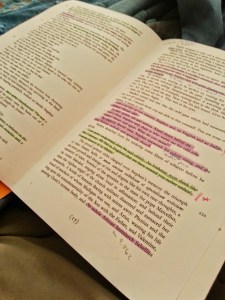
Stately, plump Buck Mulligan came from the stairhead, bearing a bowl of lather on which a mirror and a razor lay crossed. (1.1–2)
My main copy of Ulysses (of course I have more than one) is rather heavily annotated at this point. The first marginal notation I come across here says “State-cross: Locate S [Stephen] w/in historical/political terms—G.B., HR Church.” I don’t know where this insight came from, probably the professor who gave the course in which I first read this book[1], but it’s a very interesting idea. Look at the sentence again:
Stately, plump Buck Mulligan came from the stairhead, bearing a bowl of lather on which a mirror and a razor lay crossed.
Lest you think this is grasping at straws, Stephen later reiterates it in conversation: “I am a servant of two masters . . . an English and an Italian. . . . The imperial British state . . . and the holy Roman catholic and apostolic church” (1.638–43).[2]
Ireland in 1904 was a colony of Great Britain. It’s not the sort of colony we usually think of when we talk about colonialism, because nowadays the Irish are seen as white and colonialism is something that white people do to non-white people (for example, the French in Algeria, the Belgians in the Congo, the French in Indochina, the British in India, the British in Burma). But the British have very much colonized Ireland and were governing them. On the other hand we have the Roman Catholic Church (or Holy Roman Apostolic Church, as Stephen Dedalus would refer to it), which exercised at the time (and for most of the 20th century and on into the 21st) enormous power over the people of Ireland. One thing I’m going to argue in this essay is that there are strong colonialist themes running through this book. This is not a controversial claim—a cursory search of the internet provides a number of papers, such as Roghayeh Farsi’s “James Joyce’s Ulysses: A Post-Colonial Text,” which argue essentially this. Worth noting is that Joyce began writing in 1918, shortly before Ireland declared its independence (January 1919) and began the Irish War of Independence with Britain; this war concluded around the time Ulysses was published in full (1921 versus 1922). Where is the line between a colonial novel and a post-colonial novel? We must be very close to it.
I’m getting a little ahead of myself. Let me back up a bit. The first three episodes of the book make up the “Telemachiad,” which is to say their focus is on our Telemachus, Stephen Dedalus.
Stephen Dedalus is one of the main characters in the book; in this section we meet two major supporting characters, Buck Mulligan and Haines. They are all three staying together in a Martello Tower, which is one of a bunch of towers put up in Ireland to look out for the possible invasion of Napoleon.[3]
Buck Mulligan is a medical student who is witty, quick to make up songs and ditties, and who holds nothing sacred, as he tells Stephen: “And what is death . . . your mother’s or yours or my own? You saw only your mother die. I see them pop off every day in the Mater and Richmond and cut up into tripes in the dissectingroom. It’s a beastly thing and nothing else” (1.4–6).
Haines, on the other hand, is “a ponderous Saxon [i.e., British] . . . [who is] bursting with money and indigestion” (1.51–2). He is every inch the colonial Brit, although he would no doubt claim himself enlightened. Tellingly, Mulligan observes that Haines’s father “made his tin by selling jalap to the Zulus or some bloody swindle or other” (1.156–7). This is a reflection of British colonialism[4]—the Zulus lived in Southern Africa and were defeated in the Anglo-Zulu War in 1879, which led to the fall of the Zulu empire. Haines is writing about Irish folklore (a book, I believe, possibly related to his degree) and has come to Dublin to do research. It is interesting that he is in fact living with two Irish men, neither of whom is exactly interested in serving as a native informant to him, but both of whom really want something from him—Mulligan wants money, and Stephen wants him to go away[5]. In fact, Stephen and Mulligan’s attitudes toward Haines are well, if unintentionally, summarized by Frantz Fanon in The Wretched of the Earth, when he writes of how native intellectuals are taught by colonialist bourgeois to believe in the ideals of Western civilization, which he describes as existing on a “Greco-Latin pedestal” (46). During the course of the decolonization process, the native intellectual begins to understand how indoctrinated into the ideology of his conquerors he has been, and eventually “he turns himself into an awakener of the people; hence comes a fighting literature, a revolutionary literature, and a national literature” (223).[6] So on the one hand we have Stephen the bard who wants to be rid of the British, and on the other hand Buck Mulligan the medical student who wants to Hellenize Ireland (1.158). What a pair. Haines’s attitude is typically apathetic, saying “An Irishman must think [that he is a servant of the imperial British state], I daresay. We feel in England that we have treated you rather unfairly. It seems history is to blame” (1.647–9). This is, implicitly, the viewpoint Jean Paul Sartre is raging about in his introduction to Fanon’s aforementioned text.[7]
The presence of the Catholic Church should also be regarded as a force for colonization; as Fanon puts it, “The Church in the colonies is the white people’s Church, the foreigner’s Church. She does not call the native to God’s ways but to the ways of the white man, of the master, of the oppressor” (42). And indeed, the Catholic Church’s oppressiveness in Ireland has been well documented (see for example Christopher Hitchens’s article(s) on Mother Theresa, or any of the millions of things written about the Magdalena asylums).
I’m nearly seven hundred words into this section and I have covered about a page and a half of the text. Seems about right. That aside, I think I have begun to make my point about the colonial/post-colonial themes in this episode. This is something that took me very much by surprise when I began re-reading this section, as it happens—in between my previous reading of the book and this one, I spent a great deal of time studying post-colonialism and post-colonial literature, so it really jumped out at me in a way it didn’t before. I will not discuss the next episode here (spoilers!), but suffice to say that these themes continue there in several ways.
In the rest of the episode, the boys have breakfast, get milk from the milk woman, and walk down the shore. They make plans to meet again later for drinks—Mulligan promises Haines that “[Stephen] proves by algebra that Hamlet’s grandson is Shakespeare’s grandfather and that he himself is the ghost of his own father” (1.555–7). Then Mulligan and Haines go to bathe in the ocean and Stephen continues on to work, which takes us to the next episode. Tune in next time!
Notes
[1] I’ll do him the honor of not giving his name here. He probably wouldn’t want to be associated with this kind of project. Also, he was kind of an asshole.
[2] The basic rule of Joycean scholarship is assume everything is intentional, because it generally is. At least, this is my interpretation; I can’t claim to be deeply immersed in the academic side of Joyce at this point.
[3] I recall being told that the Irish were hoping that Napoleon would help to liberate them from the British, but I cannot find a citation for that. However, Gifford does note that the French made four attempts between 1796–8 to provide assistance to the Irish during a revolution (23). For a picture of a Martello Tower and more on their history than is strictly necessary, see their Wikipedia page. Hope that was fun for you.
[4] Edward Said often looks at the small mentions of colonialism that mostly live in the background of British literature, such as the very brief discussion of the slave trade in Jane Austen’s Mansfield Park. Which is to say, this is a brief but important mention.
[5] As with many things in Joyce’s works, this is evidently drawn from an experience he had in which one of the other guests in the place he was staying had a nightmare and fired several shots from his gun into the wall above Joyce’s bed in the night. Joyce noped out in the morning, which is why Stephen expresses to Mulligan that he wants Haines to leave and refers to Haines ranting during the night.
[6] Fanon characterizes this as the phases through which a native intellectual passes,[+] however within a single society it does seem possible to see intellectuals who are in different phases simultaneously—for example, see the letters of non-fictional people Mohandas Gandhi and Rabindranath Tagore. (Note to self: add a citation when this book is published.) I have borrowed some of this terminology from Spivak, who discusses the epistemic violence the education of the non-Western intellectuals causes and the tendency of the Western intellectual to overlook the influence of ideologies in critiquing the position of the subaltern AT LENGTH in her amazing article “Can the Subaltern Speak?”
[+] Just as an aside, I swear I had a really good quote about this but I’ve lost it. I guess I am reading too many things at once.
[7] Sartre writes, “You know well that we are exploiters. . . . With us, to be a man is to be an accomplice of colonialism, since all of us without exception have profited by colonial exploitation” (The Wretched of the Earth, 25). His entire introduction is a stirring excoriation of European imperialism and is well worth a read.
References
Farsi, Roghayah. “James Joyce’s Ulysses: A Post-Colonial Text.” The Criterion: An International Journal in English, vol. 4, no. IV (2013): 1–8.
Fanon, Frantz. The Wretched of the Earth. Translated by Constance Farrington. New York: Grove Press, 1961.
Gifford, Don, with Robert J. Seidman. Ulysses Annotated: Notes for James Joyce’s Ulysses. 2nd ed., rev. and exp. Berkeley: University of California Press, 1988.
Said, Edward. Orientalism. New York: Vintage Books, 1978.
Spivak, Gayatri Chakravorty. “Can the Subaltern Speak?” in Cary Nelson and Lawrence Grossberg (eds.) Marxism and the Interpretation of Culture. London: Macmillan, 1988. Found online at http://www.mcgill.ca/files/crclaw-discourse/Can_the_subaltern_speak.pdf. (Online version is the referenced pagination.)
Thing I cannot cite yet, Routledge, 2014.


June 5, 2014
An Introduction to the Project
So I quipped to my mother the other day that I wanted to re-read Ulysses and blog about it. In the month of June. And she said, “The whole thing?” Sure, why not? We have just passed the centenary of the release of Dubliners, and Bloom’s Day is coming up (June 16th).[1] Plus, Ulysses is a good book of the kind that is often on people’s bucket lists but seldom read. So I thought why not write up a few of my thoughts about each section and post them up. I will try to keep it short, and perhaps my general impressions will give you a desire to delve into this amazing, beautiful book. Part of this will be chronicling my own path of discovery as I dive back into a work that is one of my favorites, but which I haven’t read in about a decade, and part of this will be a sort of general discussion of the book and its themes from as writerly of a perspective as I can manage, since that is perhaps the one thing I can claim expertise in. Maybe. The one thing I will assert is that, unlike William York Tindall, I do not think Ulysses is “too difficult for careless reading” (123). Like any book, it can be read in a multitude of ways; any reasonably focused reader can make her way through it, enjoying the beauty of the language and storytelling without necessarily grasping the historical or philosophical references.
All of my citations will be to the text in the Gabler edition (see below for citation), but I will give an episode.line number citation (e.g., 1.10) so anyone who wants to follow along in one of the free online editions can do so (the line breaks follow the Garland, New York, 1984 critical edition). Do be aware that since the Gabler edition corrects several long-standing typos, the texts may differ slightly. The primary concordance I use is the Gifford—I’ll provide a citation for that if it proves necessary.
For those not familiar with Ulysses, although the chapters are not formally titled, Joyce created two schemas that divided it into eighteen episodes, all of which have names that refer to the Odyssey. These are the Gilbert schema and the Linati schema. I will probably not refer to these frequently, but you should know where some of this material is coming from. Other major reference works I will cite as I go along.
As for what is the best way to read the book, I don’t think there’s any one right way to go about it. In high school, the first few times I attempted to make my way through the text, I had only the text itself. The first time I actually made it through, in college, I had the Gifford annotations by my side and frequently read it simultaneously with Joyce’s text. On this reading, I am making my way first through the episodes, then referring to the Gifford to clear up any lingering questions (and draw inspiration for these little essays). Any of these methods may work for you. For those who don’t have time to run to the library before starting this little adventure, this website containing hypertext annotations may be of use to you.
I feel at the outset that I should define my goal more specifically before I begin. This is not meant to be a series of scholarly essays into the text of Ulysses, although some of my essays do take on that form to a certain extent. This is also not meant to simply reproduce the information contained in any of the particular references I’ve consulted. Instead, I want you to read along with me and consider this a kind of book club discussion. You can find an ebook version here at Project Gutenberg or elsewhere on the web. I hope you’ll join me for a brief tour through a magnificent work of art.
Notes
[1] I’d originally planned to post one essay per day between May 29-June 16, but that isn’t happening, is it. Take what you can get, that’s my advice.
References
Joyce, James. Ulysses. Edited by Hans Walter Gabler, with Wolfhard Steppe and Claus Melchior. New York: Vintage Books, 1986.
Tindall, William York. A Reader’s Guide to James Joyce. New York: The Noonday Press, 1959.


June 1, 2014
That Sick Feeling: From Hell Reviewed
Note: I read this book in October 2013, and worked on the review for almost six months, then forgot about it. I don’t know why this happened. The date in my Word doc is October 13th.
Alan Moore and Eddie Campbell. From Hell. Marietta, GA: Top Shelf Productions, 1999. 572 p. 095857834-6.
In Whitechapel, London, in the 1880s, humans live in powerless poverty and squalor. By the end of the decade, hundreds of the unemployed would be injured at the (1887) “Bloody Sunday” rally in Trafalgar Square, where they were protesting their lack of employment and the Irish Coercion Act, a crack-down that underscored how powerless the working class were. Beneath working class men, the “working girls” of Whitechapel were even less secure as they tried to make their way in the world. Often married very young, at the age of 12 or 13, they were condemned to poverty and prostitution when abandoned by their husbands (the ones who didn’t die in childbirth, anyway). By the end of the 19th century, wealthy women could inherit land, but womankind in general still could not vote. And worse, a monster was preying on the women of Whitechapel. In the fall of 1888, an unknown person or persons murdered at least five prostitutes in London’s East End, vivisecting four of them. “Jack the Ripper,” as the killer came to be known, was never caught, and the theories the case has spawned live on today, too many to enumerate.
Alan Moore and Eddie Campbell’s graphic novel From Hell takes as its starting point the theories of one Stephen Knight, who evidently heard the story in his book Jack the Ripper: The Final Solution from the illegitimate son of English painter Walter Sickert, Joseph “Hobo” Sickert. (Walter Sickert, incidentally, was somewhat obsessed with the murders and was fingered as Jack the Ripper by a number of theorists including Patricia Cornwell, based largely on the evidence that he drew moody paintings of murdered women in dark rooms and that he allegedly had a congenital deformity of the penis.) Joseph Sickert (also known as Joseph Gorman)’s story makes his father only an accomplice, but the whole thing is so rotten that’s hardly a consolation. Basically Knight/Sickert maintain that: Prince Albert Victor Christian Edward (“Eddy” to his friends), grandson of Queen Victoria, knocked up a working class girl, Annie Crook, and secretly married her. Of course Victoria finds out about the whole nasty business and sends the girl to her physician ordinary, Sir William Gull, who certifies her insane. The baby (a daughter), however, survives, and when a group of prostitutes led by Marie (or Mary) Kelly find out about her, they try to blackmail Walter Sickert and Victoria asks Gull to “take care” of them too.
As it happens, according to the way our boy Joseph tells the story, his mother was the daughter I just mentioned, so he is descended from legitimate but unacknowledged royalty. Decide for yourself how much doubt that casts on the story. The story also ignores the powerlessness of the prostitutes to actually carry through on any kind of threat–while it seems possible a gossip tabloid might have run the accusations (maybe), it seems unlikely that anyone would have believed them in the face of a denial from Victoria.
Running behind all of this is a hint of Freemasonry: Allegedly, both Prince Albert Edward (later Edward VII, Prince Eddy’s father) and Sir William were masons, hence Gull’s willingness to do something that would admittedly seem entirely insane to any reasonable person.
In the hands of Alan Moore, though, this story becomes slightly more elaborate. Gull is a mason, yes, and a patriot. He has also suffered a stroke-cum-theophany; it is not entirely clear that he is the same person after that event, although the implication is that he is, just with more outlandish theories. Gull is certainly bidden on to his task by Queen Victoria, but he also sees himself as striking a blow in a battle for supremacy between men and women that dates back to the stone age (see Robert Grave’s The White Goddess and other books about the idea of a mother goddess being supplanted by a father god for more of this idea). He is an unrepentant misogynist who worries that women will somehow gain back the upper hand and (re)subjugate men. Additionally, he sees himself as moving society forward, noting that some crimes can cause the public to agitate for certain things, as in the case of the Ratcliffe Highway Murders leading to the formation of a police force in 1811. What exactly he is leading society toward is unclear, but at a pivotal moment he tells his (semi-literate) driver and assistant, Netley, “I have given birth [to the twentieth century].”
Moore does a good job of allowing Gull enough time to explain his theories. In fact, he spends an entire chapter driving around London with Netley, talking about the architecture of Christopher Wren and Nicholas Hawksmoor, the Dionysian architects, the solar and lunar symbols of the battle between men and women, prostitution through the ages, and how all these symbols, both pagan and Christian, get rolled up together into one big ball of conspiracy that makes sense if you don’t look at it too hard. Then Moore undercuts Gull brilliantly: at the beginning of the next chapter, we see the morning routines of Sir William contrasted against the woman who will be his first victim, Polly Nicholls. Gull wakes in a bed, is fed a good meal prepared by his cook, and is driven to work in a coach. Polly, on the other hand, is sleeping on a bench, sitting up against a wall with a clothesline strung across to stop her from falling over. This was in fact the cheapest form of accommodation available to Londoners of the era. To see the privilege on the one hand and the crushing poverty set against it is to realize how out of touch with reality Gull really is, and how unlikely his fear that women will somehow “win” is.
The story from there on out is roughly the one you are probably somewhat familiar with. Women die, the police continually foul up the investigation, and Gull grows increasingly out of touch with reality. The narrative begins to flip back and forth between Gull and Inspector Abberline, the hapless but clever detective assigned to the case.
It seems moot to discuss Sir William Gull and whether or not he was really the murderer. Nearly every man of any social standing who lived in London during that autumn has been theorized to be the Ripper, as well as most men of no social standing. Some of the information related here about Gull seems to be true: he did come from an impoverished background, he was a doctor, he was quite intelligent, and he did seem to have some disregard for what today we would consider to be medical ethics. His selection as the murderer makes as much sense—or lacks as much sense—as anyone. Personally, I think there were some who have been named, like Francis Tumblety, a known misogynist who boasted that he had a collection of female reproductive organs, who were probably more likely suspects. But in the context of From Hell, Gull’s character is built so that he makes sense as the killer, and that is what matters. It can help to remind oneself that this is fiction based on facts; as Eddie Campbell put it in a blog post, he’d “always liked to imagine that our William Gull is a fiction who just happens to share a name with a real one who existed once” (source).
In a certain sense, it doesn’t matter who the killer actually was because the killer was everyone. Several of the women Jack the Ripper offed would have been dead within a year or so anyway, since they were impoverished, living in insanitary conditions on the streets of Whitechapel, which as far as I can tell was quite a bit worse than what you might find in a major city today—for example, Londoners of this era had to deal with diseases like tuberculosis, attacks from packs of feral dogs, crime, diseases caused by the terrible pollution and inadequate nutrition, and poor housing . . . and of course, if they were lucky enough to have a job, they might have to face conditions in the factories . . . if not, there were workhouses. This is reinforced by the scene in which Campbell and Moore depict hundreds of people writing letters to the police posing as Jack—a disturbing but real event. To put on my Žižek hat for a moment, is this an outgrowth of Victorian anxiety about the poor? Or, alternatively, about women, women’s place in the world, sex, religion, colonialism and aliens in the metropol[1] . . . the list goes on. Moore presents a holistic view of the crime that, in some way, should clarify what happened but in actuality serves only to confound what has happened. It is a conceit of crime fiction that crimes can be picked apart and a definite killer and motive can be found. In reality, life is rarely cut-and-dried. Certainly, general motivations can be discerned, but what really causes a certain person to commit a specific crime?
The thing I keep coming back to is that Mary Kelly never really finds out what’s happening to her. The audience knows, sort of, both the reasons Victoria objected to her continuance and the reasons Gull gives. Mary Kelly at best has a small sliver of the picture; she is able to piece together that her friend Annie Crook got into trouble with royalty and that her friends are being murdered one by one. She can’t see the whole picture, and Gull doesn’t oblige her with a moustache-twiddling moment of revelation before he offs her.[2] I feel like because I do see the whole picture that this shouldn’t be an issue, but I keep circling around the lack of resolution (obviously, because I’ve been writing this review for six months—can you tell?). Perhaps this is reminiscent of the way the people of London felt, knowing something was walking among them that they could not understand. Mary Kelly, for her part, likely felt nothing at all for very long.
To bring this to a kind of conclusion: The collected version of the comics has not only a short epilogue, “Dance of the Gull Catchers,” that tackles some of the difficulties surrounding naming Gull as a suspect, but also Moore’s extensive annotations explaining the origins of his theories and various obscure pieces of Victoriana. The art is illustrative without being overly graphic. The writing is solid. Really, if you haven’t read this book yet . . . why not?
Notes
[1] The Victorians were, as far as I can tell, a very anxious people. Or at least a people whose anxieties have been highly researched.
[2] I should mention, for those unfamiliar with the Kelly murder, it was really gruesome. The real life killer really dissected her; the best that can be said is that the coroners at the time thought she had been killed relatively quickly and then mutilated. I don’t recommend looking up the photos unless you have a strong stomach.


May 12, 2014
Returning My Books
Today I woke up and I knew it was the day: I was going to return my library books. This is important if you want to graduate, because if you don’t return stuff they hold up your diploma.
At first, I thought I was going to put them in my backpack and bike down to campus to return them. But when I stacked them up:
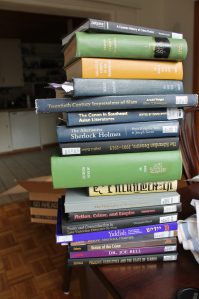
I hope I got them all.
Scratch that idea. Oh well. I put them in a box, drove to the library after aikido class, parked illegally, and hustled them over to the book drop.
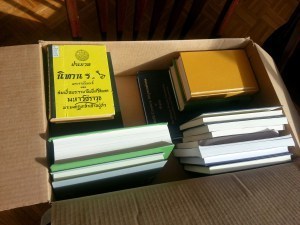
Such books. So box.
Then I silently bid them farewell.
Returning my library books means a lot of things. It means that I will be able to receive my diploma. Hopefully. If I got them all. It also means my academic career is basically over. Notice that I am not adding “for the time being,” as I have in conversation to myriad people. I have finished my MA and I am probably done.
I have mixed feelings about this.
It will be unsurprising to those who know me to hear me say that when I was in high school I wanted to get a PhD. There were probably a lot of reasons for this–I’m very ambitious but not especially interested in high power career paths; I knew that PhDs were associated with smart people and I’m smart; I went to a high school where that kind of academic achievement was relatively rare among alumni, so it would have proved how different I was (let’s face it–how superior) to my fellow students.[1]
Time wore on of course. I did an undergraduate degree and felt still interested in doing grad school, but first I went to Viet Nam for a year, came back, got a job, met a guy and fell in love, then left my job and moved in with him. At some point in there I did actually start grad school, but it wasn’t a PhD program–rather, it was an MLS[2], a professional degree designed to help me reinvent myself in a bad economy. Through a somewhat circuitous series of events, I wound up enrolled in another department, doing a second MA in Southeast Asian studies.
During this time period, I began to understand more clearly what was involved in a PhD. Unlike a BA, which you can basically get these days if you are capable of basic literacy-type tasks, a PhD requires an immense amount of reading and preparation, qualifying exams, and then basically writing a book. And the book has to be original work. It can’t be a collection of book reports or whatever. This isn’t a task where you can get someone to tell you if you have found the right answer. You are creating new knowledge; that is what people with PhDs do. In short, it’s a very stressful process.
In fact, I did some original research over the course of my MA, and that was hard.
The stress isn’t the only consideration, though when you are married it is certainly something you get to thinking about. I don’t even really need to prove how terrible the job market is for people with PhDs in the humanities–if you are curious, just go and look at any article the Chronicle of Higher Education has published in the last five years. In fact, if you have a desire to do things like: stay married, have kids, have spare time, be a novelist rather than a literary critic, have a stable income with health insurance, not be on food stamps, not have to move every few years, then you might find life as a professor quite trying.[3]
Ultimately, a combination of the above and other factors influenced me to decide that I wasn’t going to apply for a PhD. So there goes that.
It’s a weird moment. On the one hand, I know that missing out on four years of earnings and 401k contributions is not great financially, even though I didn’t take on any debt to pay for my schooling.[4] I know also that there would be no job waiting for me when I finished, and that it conflicts with some of my other life goals. And, one might argue (when talking to someone like me), given the way writers use any stupid excuse to avoid writing, consider that graduate school is really one big excuse for why I don’t have time to sit down and write another chapter of my novel.
In other words, if I want to write a novel, I should stop fucking around and do it. Now is the time.
On the flip side, though, giving up on a dream is never easy, is it? And let’s face it, PhD-holders are actually creating new knowledge through their research, which is really exciting. Getting to think about the topics they work on (in my case, philosophy and post-colonial literature and that sort of thing) is a lot of fun. Who wants to sit in an office and do technical writing when they can be thinking about philosophy?
Eventually, you have to weigh your options and make a decision about the kind of life you want to lead. What’s important to you? Stability, financial security, an exciting career, a family, having time for outside pursuits, ambition, a less stressful life, a happy marriage? Regardless of what you wrote in your “What I Want to Be When I Grow Up” paper at age 17, there isn’t a wrong answer here. Priorities can change. In fact, they should change–anyone who has the same priorities at 31 that she had at 17 is probably stupid.
I still miss my books though. I miss the excitement of learning a new language. I miss the thrill of putting little pieces of theory together and coming up with something neat. I don’t miss: the stress, the stress eating, the stress picking-fights-with-my-loved-ones, the stress crying-because-a-professor-was-mean, the sense of life-or-death about what I was doing,[5] the way academia provoked my workaholism to new extremes, the not having time for what few friends I managed to hang onto, not having time for entertainment outside of classes…
I won’t go on because I think I have made my point. I’m certainly not spending my time crying into my oatmeal about this, but neither am I resolved enough about it to bring this blog post to a happy conclusion of some kind. I am enjoying my extra time to do things like aikido, writing, home improvement projects, and triathlon training. I am also reading a lot of philosophy[6] and other books on my own, things I would never have had time for if I weren’t graduating, and I’m starting to think about teaching myself a new language. But I still miss being in classes, working in the library, researching new topics, even (to some extent) writing papers.
Being in academia sucks. Not being in academia also sucks.
The end.
[1] If you have been to high school and not harbored this feeling, well, I commend you but I think you’re lying to yourself.
[2] Technically my alma mater awards an MA (in library and information studies) rather than an MLS (which itself stands for Masters in Library Science and please don’t ask me why this is different). I only refer to the MLS here to make it clear I did two different masters degrees.
[3] Obviously the job prospects are contingent on the field. I know some PhDs who found tenure-track professorships after graduating and some who didn’t.
[4] In fact, I think I paid almost nothing in tuition for the last four years, but I worked my ass off at 2-3 jobs at a time to do so.
[5] I suppose this is true for several fields, but it seems especially bad in academia because students don’t get sick days. If you are sick, you still go to class because…you have to go to class. As an undergrad, I missed class the time I had the puking flu so bad I couldn’t stand up and walk farther than from my room to the bathroom. (As a grad I didn’t get sick.) But no one should be forced into an atmosphere where that kind of behavior is the norm. If you’re sick, you should be able to stay home.
[6] Because let’s not pretend that leaving school should ever be the end of learning. Especially at the MA level, I have the skills to continue doing advanced research on my own, although I can probably not ever publish because no one really cares what I have to say.


May 7, 2014
Em oi! #398: Happy Birthday, Your Majesty
Pretend I got this up on Saturday for my birthday and not four days late. Thank you.
The idea that you shouldn’t care about your age is about as deeply ingrained in our culture as the idea that you should–check out the phrase “age ain’t nothin’ but a number” next to Nicole Kidman getting botox. I think it was my mother’s particular defiance of age-related stereotypes that rubbed off on me most of all. When she turned 50, someone sent her some black balloons, and she called up the flower shop that delivered them and gave them a stern talking to.
I can’t claim the idea of the princess/queen dichotomy in American womanhood is entirely something I came up with–I believe it was in one of the books I read before I got married, like One Perfect Day, where the author remarked that it is a very particular fantasy to want to be a princess (a childish position of little responsibility) rather than the queen (an adult position with lots of associated power). Of course, I never wanted to be a princess…but I’ll be queen, sure.
Anyway, here’s a picture of me cross thing the finish line at a 20km race on Saturday. I don’t have a picture of myself at 21 doing the same because at 21 my idea of a big day was one where I walked to the library a mile away. Whew. (I’m exaggerating a little, but I wasn’t a runner at the time.) I’ve come a long way since then.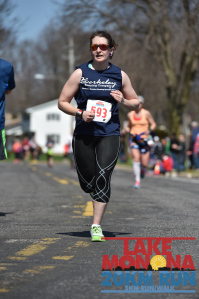
I’ll file the comic under PA3015.B48 L86 2014, for Classical literature–Literary history–Knowledge, treatment, and conception of special subjects, A-Z–Birthdays.


April 16, 2014
Em oi! #397: It also Means “of the Greatest Importance.”
Here is something interesting I found out about cardinals: If you are a priest who is ministering somewhere that it might potentially be dangerous for you to be made a cardinal, the pope can make you a cardinal in pectore, which means he makes the appointment but keeps it secret (from everyone, including the apointee). Later on, he can reveal the appointment. But if he dies (or retires from the papacy, I guess?) before it is revealed, the appointment expires and the cardinal goes back to being a priest (or bishop). This kind of blows my mind, but I guess it is related to how the college of cardinals functions–not surprisingly, for a group that is full of old dudes, seniority is important.
Our yard might look like this picture if any of our trees (save the evergreens) had any leaves on them yet. Also we sold the swing set, it is not there anymore. And Edgar has dragged about a dozen sticks (many of them as big around as my forearm and longer than he is) out of the woods and piled them up in the middle of the lawn. He seems quite pleased with himself. If they start building ramparts, I’m going to get worried.
We’ll file this under ND1329.3.C37 L86 2014 for Painting–Special subjects of painting–Portraits. Group portraits. Self-portraits–Special subjects, A-Z–Cardinals. No, I am not sure why this is a call number.
Happy Pesach everyone! I hope you had a good seder (or seders if you are more ambitious than I am) and that you are having a good week of not eating bread. I have not had any bread in several days now, yes indeed! Although I must admit I have eaten some tortillas. A line has to be drawn somewhere I guess.
(Ok, actually the rabbis drew it on the side of don’t eat things with flour in them other than matzos during Passover. But they never had to go out to dinner in a non-Jewish city during Pesach.)
I guess this comic is somehow timely because Easter is coming up this Sunday. Happy Easter to all my priest relatives (and priest-to-be somehow-related-by-marriage people)! Actually, this is not a joke, I have one relative who is a priest, and also two of B’s relatives are priests-in-training. That’s a lot of priests for a Jew to be related to. It seems unusual. I also have a relative who studies the medieval Church although she isn’t herself Catholic. I don’t want to sound like I’m bragging, but I can get questions of dogma answered all over the place.
After Easter though, comes the holiday we’ve all been waiting for: Cadbury-Creme-Eggs-Go-on-Sale-Monday.
You were waiting for that too, right? (Cough) I just started training for a triathlon, so I’m trying to stop buying junk food. I’m trying to eat less sugar. I’ll let you know how that works out. Right now I am very hungry and have been eating like it was my job. Probably because I can’t fill up on bread all the time.
It’s, um, Wednesday. Pesach ends Monday at sundown, I think. Be strong.


April 5, 2014
Em oi! #396: Airplane Hell
This was on a flight from Salt Lake City to Denver. Let me just say that I am super paranoid about my headphones–not only do I worry about disturbing others, I worry about damaging my hearing, so I keep music/podcasts turned down REALLY low. Evidently this guy didn’t give a fuck if everyone could hear his music or not. He’ll probably go deaf, serves him right I guess. Or that’s about what I was thinking. But at the end, when we got up to get our luggage, I started to lean over the seat to vent spleen on the guy. As I did so, I saw some of the stuff he was texting to a friend on his phone (well, we were on the ground, I guess). Essentially he was in his 30s or 40s, on his way to visit a woman his family disapproved of (they believed he was a sinner because he was going to see her, and she had posted some “mildly sexy” photos of herself on the internet), his family also disapproved of his lack of religiosity… I just lost steam. Poor guy was old enough that he should have a life for himself, but he was so totally caught up in his family’s feelings.
It would have been easier if he was just the stupid teenager I’d assumed he was. Don’t get me wrong, he’s still a terrible person. But I didn’t yell at him; his life seemed rough enough already.
Anyway. We’ll file this under BJ2139.L86 2014, for Social usages. Etiquette–Etiquette of travel–Special topics–Airplane travel.
I went out to Black Earth to run the Black Earth 10 Mile Race today. It was quite entertaining–I knew about a third of the field, it felt like, or they were friends of friends. It was especially funny to hear people say “Here come the fast people” as I approached with my friend R. Not sure how long I’ve counted as a fast person. We kept a pretty steady 8:00-8:30 pace for the first 9 miles–it was an out and back course, very flat, so it was relatively easy to keep pace, and I knew when we hit the turnaround that I was in 9th place, so it was easy to drive just a little bit harder on the second half to move up a few spots to 7th. Just shy of the 9 mile marker, two people we’d passed earlier (a man and a woman) came up behind us looking to make a move. I dropped the hammer and took off. For a while, I was running about a 6:40. It was amazing, I was flying.
My hands started to tingle. I realized that I could only hold that pace for a limited amount of time, and the clock was running down. I was very shortly going to have make a choice between passing out and slowing down.
I finished, I believe, in 8th place. I didn’t win the free shoes gift certificate. But I learned something new about how fast I can really push myself to–maybe if I start doing intervals once a week (my PT suggested this), I will actually be able to hold a 6:40 pace for a little while longer.
That’s enough of that. Here are some pictures of dogs and other animals I took.

Macalester, or Mac for short.

Edgar is happy when Bear is around.

Bear, who stayed with us for a week while his person traveled.

Kali and Bear go on adventures.

Kali.

Bear, lying down.
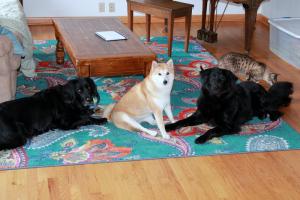
Smile nice for the camera, guys.
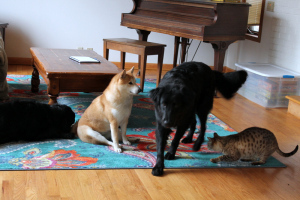
Smile, I said.

Guys, come on.
Anyway I think my SAD is over so I will try to post more frequently now. I still have a couple of reviews in queue and a few more to write, plus I’ve recently fallen down a post-colonial studies rabbit hole and I’m excited to talk about that (everyone in real life is tired of listening to me talk about it, actually).


February 24, 2014
Em oi! #395: I Kant Believe It
This started as more notes to myself on the noumenon, because I have been reading The Parallax View and had to look it up. I dragged through A Critique of Pure Reason in college and also parts of Critique of Judgement and (if I’m recalling correctly) The Metaphysics of Mortals, but I can’t say Kant’s theories ever really resonated with me. Yet since reading First as Tragedy, I’ve had a new respect for him. In particular, I was struck by this passage:
The recent Revolution of a people which is rich in spirit, may well either fail or succeed, accumulate misery and atrocity, it nevertheless arouses in the heart of all spectators (who are not themselves caught up in it) a taking of sides according to desires which borders on enthusiasm and which, since its very expression was not without danger, can only have been caused by a moral disposition within the human race.
Which is to say, while “actual history is confused” on the question of whether or not true [i.e. ethical] progress is possible, spectators across Europe were remarkably sympathetic to the French revolution (Zizek, First as Tragedy, then as Farce, 106).
I think now that this quote is less affecting out of context. Anyway, the remarkable thing was for me that I looked up the noumenon, made my notes, and then suddenly understood exactly the point Zizek was making and sailed on through another several pages. (Then he came to some argument rooted in Hegel and I got bogged down again.)
Anyway I should add that according to Wikipedia, the conflation of the noumenon and the ding-an-sich is not quite so straightforward as the Ziz makes it seem. But you probably already suspected as much.
At any rate, having read my comic, perhaps you are now in a position to appreciate this one by Zach Weiner.
Ok, I have now somehow passed an hour looking at pictures of cats on imagur. Probably time to call it a night.
We’ll file this one under B2799.N68 L86 2014, for Philosophy (General)–Modern (1450/1600-)–By region or country–Germany. Austria (German)–By period–Later 18th and early 19th centuries–Individual philosophers–Kant, Immanuel, 1724-1804–Special topics, A-Z–Noumenon. Before you say “Don’t hurt yourself on that topic heading there,” I just want to let you know that PT2100.K3 is German literature–Individual authors or works–1700-ca. 1860/70–Goethe, Johann Wolfgang von, 1749-1832–Biography and criticism–Biography–Personal relations–Relations to friends and contemporaries–Individual friends and contemporaries–Other friends and contemporaries, A-Z–Kant, Immanuel. So just be careful what you wish for.
By the way, I posted two reviews lately that you might have missed: this one of the play Red and this one of First as Tragedy. More reviews soon!
Okay, wait, I just remembered something I have to tell you about Kant. It’s a story my father told me when I was a kid: (and just to ruin it, I have forgotten the setup but) there is a guy in a neighborhood in Germany (well, Prussia). Every day he goes out for a walk at the same time. Every day he comes back at the same time. One day, his neighbor is raking leaves in the front yard and sees this guy walk past, and he has one foot on the sidewalk and one in the gutter. And half an hour later, sure as clockwork, back he comes, one foot on the sidewalk, one in the gutter. And that was Immanuel Kant. Later on, Dad told me that Kant broke philosophy, because he thought of it all. I don’t know if that is exactly true (philosophy has certainly continued after Kant, and gone down a lot of new and interesting alleys), but it perhaps explains to you what a huge and insurmountable obstacle he is in the study of philosophy. You Kant get there from here without going through him.
. . .
Ok, now I’m really going to bed.







